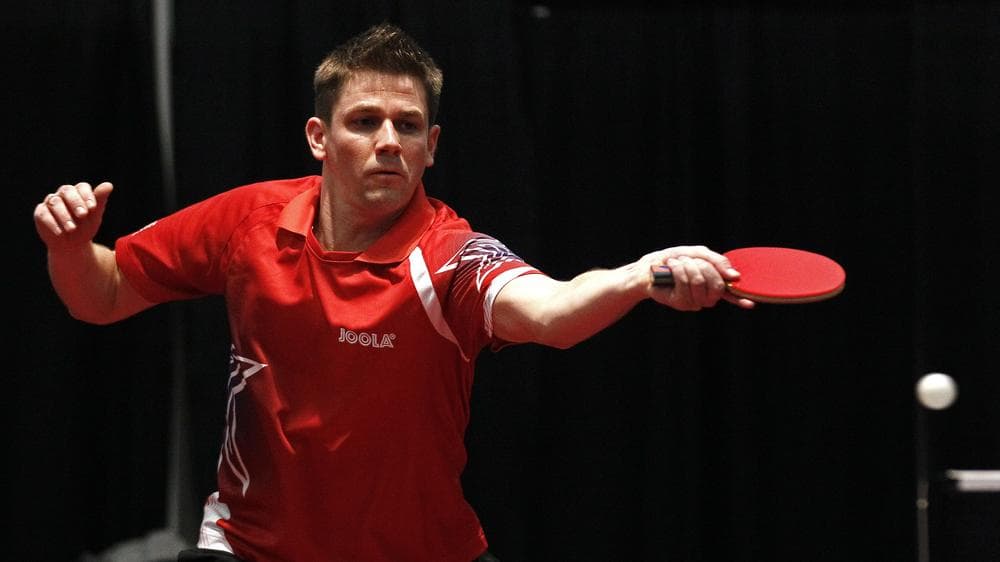Advertisement
Barney Reed: The John McEnroe Of Table Tennis
Resume
By Dave DeWitt
Barney Reed was on a roll. After dropping the first game of his first match in the Olympic Trials, he came roaring back. His topspin backhand was working and he was bouncing on his toes.
But with each point lasting just a few seconds, fortunes can turn quickly in table tennis. And they did again for Reed. His shots started landing an inch too long, and after he completely whiffed on a forehand, he looked at the table in disgust. And then he saw it – a scratch. He immediately put his paddle down and headed for the official.
[sidebar title="It's A Ping-Pong World" width="280" align="right"]Is ping pong the most influential game on Earth? Roger Bennett and Eli Horowitz think so. Hear Bill Littlefield's interview with the authors of Everything You Know Is Pong.[/sidebar]"I’m a player and I have rights," he said. "And the rights that that table is an imperfect table is not my fault."
The officials huddled, but decided not to change tables. Incensed, Reed lost nearly every point remaining in the best-of-seven match.
"Table or no table, I lost the match," he said afterwards. "The Canadian player, he played better today. Hopefully, tomorrow I can raise my level. But, I think, some of the rules, just because they are rules, doesn’t mean you have to follow them. A stupid rule is still a stupid rule."
This is Barney Reed. Talented. Headstrong. John McEnroe with a rubber-coated paddle. But that’s not the whole picture, says his friend and fellow competitor, Michael Landers.
"On the table, everyone changes. Everyone’s trying to win," Landers said. "It’s the Olympic Trials, everyone’s trying to get a spot to secure their dream. People shouldn’t judge other people based on their behavior on the table. Everyone should know that Barney is just a great guy."
Landers, at 19 years old, is the latest prodigy in American table tennis. 15 years ago, Barney Reed was that guy, this country’s best hope to make it big, and turn a basement pastime played by 20 million Americans into a revenue-generating sport. He was young and charismatic. He played with Conan O'Brien on TV, and against rappers in Vegas.
Then, in 2002, Reed was banned by the US Anti-Doping agency for performance enhancing drugs. Reed said it got into his system through an over-the-counter supplement from GNC. In 2008, he was hit with another one-year ban, this time for marijuana. He says he has a medical marijuana card at home in California.
His dad, Barney Reed, Sr., is a former board member of USA Table Tennis and has been at his side through it all.
"There’s been many changes over the years, since he was a little celebrity, a young celebrity, in a small sport. He’s much more mature now, more focused, less distractions," said Barney Sr.
But Reed is still an agitator. He has recently led an effort to organize players and demand a bigger piece of the small table tennis pie.
"Our sport right now has no light at the top," Reed said. "Every other sport has professional leagues; they have avenues for players to make money. Our sport is more interested in raising money. Our people that are in charge, they raise money for their own personal vendettas for going to China for ping-pong diplomacy."
Now at 33 years old, Reed travels the world, playing wherever he can and winning whatever money is available. He and his girlfriend sell table tennis t-shirts on the side. He drives a 17-year-old Geo Prizm he got for playing an exhibition at a car dealership.
He’s also become a mentor to the younger generation of US players.
"Well, because I didn’t have that coming up," he said. "When I was their age, the top players never did that for me. And that’s just not the way the sport grows."
Growing the sport means playing in the Olympics, and Reed had one last shot at being the only American to make it. On the last day of the trials, Reed was battling training partner Timothy Wang for that slot.
Reed quickly lost the first two games, but won the third. He took a big lead in the fourth and appeared on the verge of tying up the match.
With the score 6-to-1, there was a furious rally. Reed crushed several left-handed top-spin smashes in a row, but Wang, from 20 feet beyond the table, returned each one with lobs that soared 5-to-10 feet higher than a nearby basketball goal. The last one looked like it’s heading off the side of the table, but a ferocious side-spin brought it back. It ticked the edge of the table and shot straight to the ground.
Reed threw up his arms and looked to the ceiling. He lost nine of the next 12 points, and a few minutes later it was over. Wang won, and Reed is heading home.
"I’m looking at 2016 even hungrier now," Reed said. "I’m just going to keep training, keep playing, and, you know, living the dream."
Reed was back courtside an hour later. Wang defeated a Canadian opponent in the final, largely ceremonial, match. Reed was the first one to rush the court, leading the other American players in picking Wang up and carrying him triumphantly on their shoulders.
It may not be his victory, but for Reed, he wins when his sport does.
This segment aired on April 28, 2012.